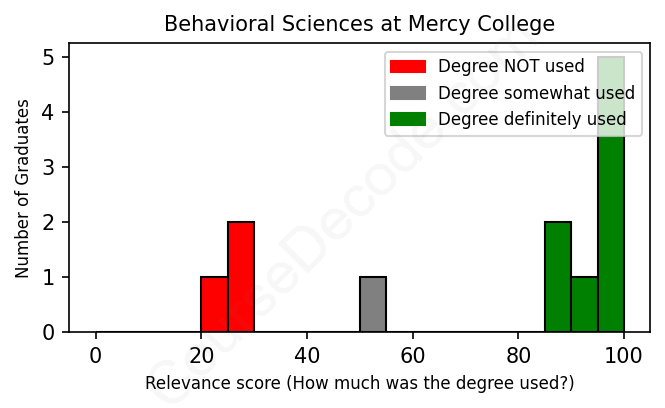
First, some facts. Of the Behavioral Sciences graduates from Mercy College we've analyzed , here's how many have used (or NOT used) their degree in their career:

These are estimates based on AI analysis of 12 LinkedIn profiles (see below).
The verdict? Above average. Overall, with an average relevance score of 73%, Behavioral Sciences graduates from Mercy College have a higher likelihood (+6%) of finding work in this field compared to the average graduate across all fields:
And for comparison, here's the chart for all profiles we've looked at across all degrees.
Also, after graduating, 41% of these graduates have pursued further education other than another Bachelor's degree (such as a Masters degree or other), compared to the average across all profiles of 35%. This suggests you may need more than just a Bachelors degree to be competitive as a Behavioral Sciences graduate.
See the details:
|
Relevance score: 100% We think this person has gone into a career highly relevant to their degree. We think this person has gone into a career highly relevant to their degree.
DEGREE INFOGraduated in 2012 from Mercy College with a Bachelor's degree in Behavioral Sciences. Also pursued further education since (see below). JOB HISTORY SINCE GRADUATIONSpecial Education Teacher Shema Kolainu - Hear Our Voices Sep 2012 - Aug 2016 BCBA LBA  Encore Support Services Jul 2016 - Present BCBA LBA  Proud Moments Nov 2018 - Present Co-Founder  Propel Advanced Learning Nov 2018 - Present FURTHER DEGREES DONE SINCE GRADUATINGMaster's degreeMercy College 2012 - 2013 Professional Certificate Florida Institute of Technology 2015 - 2016 ABOUTNo information provided. |
The top 10 most common jobs done by the graduates we've analyzed (ranked most common to least) are:
Looking at the job titles and roles held by people who graduated with a degree in Behavioral Sciences from Mercy College, it seems that a significant number of graduates have found their way into education and social services. Positions like Special Education Teacher, School Counselor, and various coaching roles are quite common. These jobs directly relate to the principles and concepts taught in their degree programs, such as understanding human behavior, motivation, and effective communication. Notably, many of these roles require specialized behavioral knowledge to support diverse populations effectively, especially children and those in crisis situations.
On the flip side, there are also several graduates in positions that don’t fully leverage their behavioral science training. For instance, roles such as Maintenance Manager or Administrative Assistant focus more on logistics and operations without applying the core skills from the degree. While some jobs like AML Analyst and Human Resources Specialist have elements that connect to behavioral insights, they're not as directly related as roles in teaching or counseling. Overall, it's clear that many Mercy College graduates have landed jobs that utilize their behavioral sciences education; however, a good number also seem to drift into areas where their degree plays a less significant role in their daily tasks.
Here is a visual representation of the most common words in job titles for Behavioral Sciences graduates (this is across all Behavioral Sciences graduates we've analyzed, not just those who went to Mercy College):

The graduates from Mercy College with degrees in Behavioral Sciences have carved out a variety of career paths, with many of them gravitating toward roles in education, social services, and mental health support right after graduation. For instance, many have started their careers as teachers or counselors in educational settings, which makes sense considering the focus on understanding behaviors and psychological principles. Jobs like Special Education Teacher, Activities Specialist, and Home Health Aide illustrate how these graduates are applying their skills in practical, hands-on environments that prioritize interpersonal communication and support. It's a solid start! As we look five to ten years down the line, many of these individuals continue to advance in their fields, taking on more specialized roles such as BCBA LBA (Board Certified Behavior Analyst) and leadership positions within organizations, like the Chief Executive Officer role mentioned. This indicates a trend toward building significant, relevant careers that align well with their studies.
However, it’s not all straightforward success. Some graduates seem to have ventured into positions that are less directly related to Behavioral Sciences—like warehouse management or administrative roles. While it’s great to see some finding success, such as moving up the ranks in companies, there are also signs that a portion of graduates may end up in jobs that, although they provide stable employment, might not fully utilize the skills and knowledge they gained from their degree. Overall, while there are certainly many examples of graduates thriving in fields that align with their education, it’s also clear that some may drift away from that path, seeking various opportunities that may not be deeply connected to their degree in Behavioral Sciences.
So, when it comes to a Bachelor’s degree in Behavioral Sciences at Mercy College, or really anywhere, it’s a mix of both challenge and fun. It’s not super easy since you’ll dive into a lot of psychology, sociology, and research methods, which can get pretty intense, especially if you’re not into heavy reading or data analysis. But if you’re genuinely interested in understanding how people think and behave, it can actually feel pretty rewarding. The workload is manageable for most students, especially if you stay organized and engaged with your classes. Just be ready to put in some effort, especially on projects and papers; if you enjoy learning about people and society, you’ll probably find it easier to keep up!
Most commonly, in the LinkedIn profiles we've looked at, it takes people 3 years to finish a Bachelor degree in Behavioral Sciences.
Looking at the job paths of these Mercy College grads, it seems like a mixed bag when it comes to making decent money. Some folks, especially those in education or social services, might be on the lower end of the pay scale, often starting with roles like teaching or as a home health aide, which usually don’t pay top dollar. However, there are also graduates moving into more lucrative roles like BCBA LBA or senior management positions, which can definitely offer better salaries. Overall, a few of them have carved out pretty solid careers, but for many in the group, particularly those in entry-level or service positions, it looks like they might be struggling to make ends meet. So, it’s pretty varied—a mix of decent pay for some, and not-so-great for others!
Here is a visual representation of the most common words seen in the "about" section of LinkedIn profiles who have a Bachelor degree in Behavioral Sciences (this is across all Behavioral Sciences graduates we've analyzed, not just those who went to Mercy College). This may or may not be useful:

Here are all colleges offering a Bachelor degree in Behavioral Sciences (ordered by the average relevance score of their Behavioral Sciences graduates, best to worst) where we have analyzed at least 10 of their graduates:
| College | Score | Count |
|---|---|---|
 Wilmington University Wilmington University
|
84 | 20 |
 Mercy College Mercy College
|
73 | 12 |
 Bellevue University Bellevue University
|
68 | 18 |
 Utah Valley University Utah Valley University
|
64 | 18 |